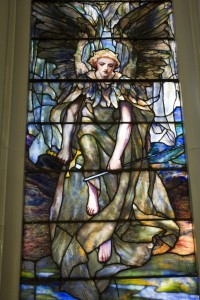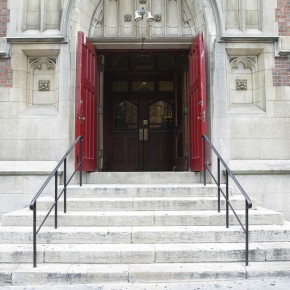 On the first Saturday of every month, my internship site runs a food pantry. Volunteers gather at 9:30 in the morning to sort groceries, place them in bags, and distribute around 120 bags of groceries to people in need. I typically do not participate in the Food Pantry but decided to this month. I arrived at 9:30 am to see about 75 people already lined up outside the church.
On the first Saturday of every month, my internship site runs a food pantry. Volunteers gather at 9:30 in the morning to sort groceries, place them in bags, and distribute around 120 bags of groceries to people in need. I typically do not participate in the Food Pantry but decided to this month. I arrived at 9:30 am to see about 75 people already lined up outside the church.
I was one of first volunteers (besides the head of this ministry) to show up and we got to work. I watched and mimicked my colleagues. I met some new people. I got to make faces at a baby who is only one day older than Oliver (and born at the same hospital no-less!). Food distribution began in earnest at 10:30 am. I helped record people who came into the door (we keeps tabs on who comes for statistics reporting – we do not require ID nor do we require people to prove their need but it is fascinating to see people who have been using this pantry for years, and since we record the dates they come, we can see when they are more financially stable and when they are not). It was a lot of fun.
About halfway through the distribution, a German tourist descended the stairwell and entered our fellowship hall. He chatted with our ministry director and it seemed he had a group of people who wanted to watch what we were doing. He kept naming dropped a name I didn’t know and said that this person told them to come “see what Advent is doing.” About a dozen people came downstairs, stood to the side, and watched. They asked questions. They all spoke in German. And they soon let us know that they were all German pastors from the Frankfurt area. Their numbers grew from a dozen to twenty. They seemed to be fans that we had a bathroom for anyone to use. We finished our food distribution, made some counts, and tried to hold off the questions from the pastors as graciously as we could. They were asking questions that our volunteers didn’t know the answer to but they were quickly introduced to me and I took them aside, once my work was done, to be grilled by these German pastors.
So – there I was – in the fellowship hall at my internship site, discussing our food ministry programs with twenty pastors from Germany. They were all much older than me but most listened to me as one in authority (there were a few who looked like they’d rather be visiting Times Square but that’s fine – who could blame them?) They spoke perfect English, asked good questions, were curious about our partnerships with local government and other congregations/synagogues in the areas, and were very concerned about the people who entered our doors. They asked if I visited them (we don’t really). They seemed partially concerned that there were no pastors (just vicars) helping with the distribution. They asked if I tried to witness their living conditions and see if I can improve them (in a perfect world, we could do that but, again, as an institution, we have limited resources – they only thing we could do, and that we do do, is direct people to other charities and government sources of help). That last question, they repeated several times. That seemed to be the hardest question to answer for them. They spoke as committed individuals to the cause of social justice. None mentioned God, or Jesus, or spoke in any faith-based language. They were concerned about knowing people, forming relationships, and having resources to help change the living situations of the people in the neighborhood. I admired that.
But it came off as very…I dunno. Their language and mannerisms seemed to suppose that my congregation should have access to financial and institutional resources that we really don’t. They kept asking about food donations from supermarkets (which we accept) but didn’t seem to understand how unreliable such a system is for us and how we use grants (or our own funds) to support our food programs. When I threw out the few financial numbers I knew (and that I might have made up based on some educated guesses), the numbers surprised them. They didn’t seem to speak, or think, in a language of dollars and cents. Rather, they assumed an environment of institutional cooperation that allowed mutual enhancement of mission. The problem is that this doesn’t exist, all that much, in the United States. We have to think in dollars and cents or else social ministry just doesn’t get done.
The group of pastors thanked me for my time and they were very nice. They were inquisitive, always asking questions, and in their questions, pointing towards institutional relationships that we might be interested in working on. But institutional relationships are hard to maintain. Right now, from my experience with our neighborhood ecumenical groups, it is individual relationships between leaders that sustain these relationships. If that one-on-one relationship is lost, or broken, the institutional relationship dissolves. That’s probably something we should work on as group – but how to change that, I do not know.
Oh. And one more thing. They kept taking pictures of ME as I spoke. That made me really self-conscious. I just wish I knew they were going to be coming. I would have dressed up. I would have put on a collar. I would have made sure that they weren’t experiencing a vicar who attended a food pantry wearing a t-shirt with a hotdog, in an eye patch, holding a smoking gun. Darn it.











